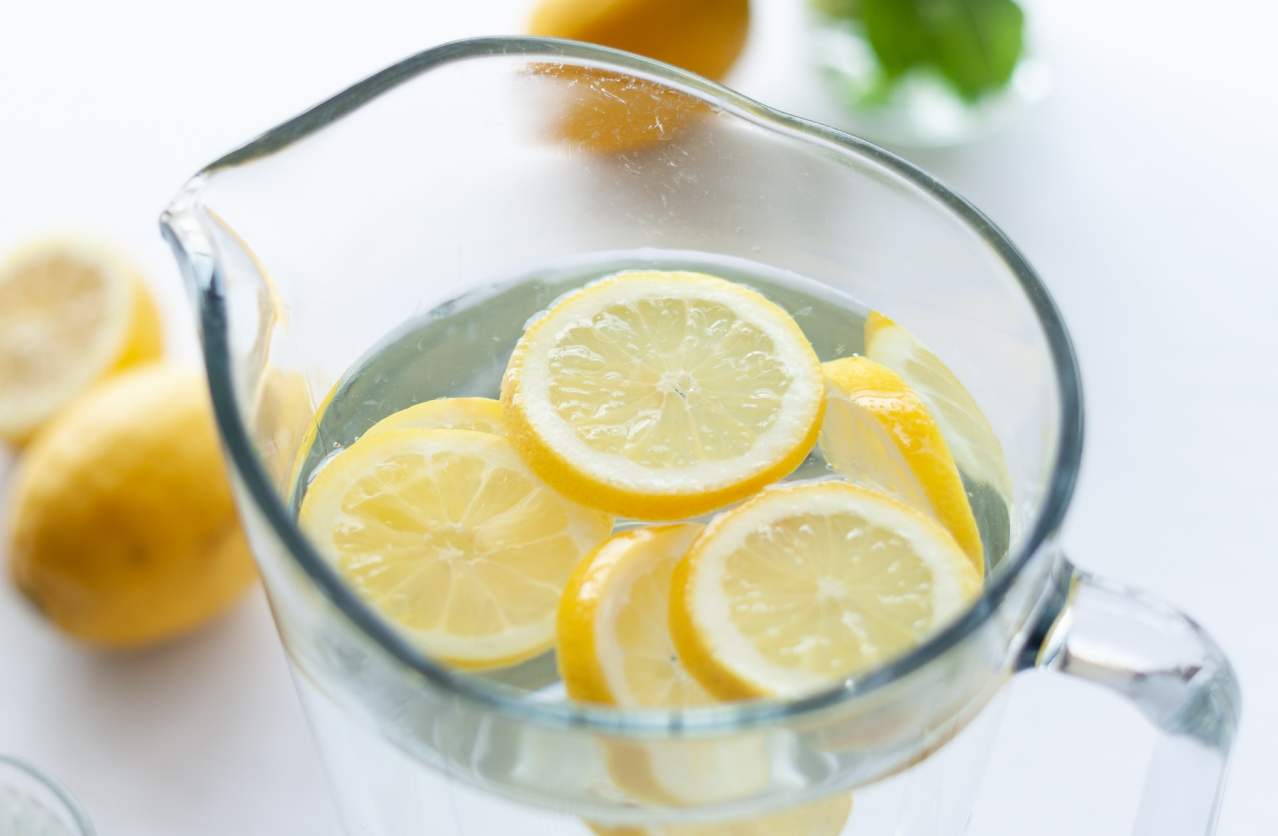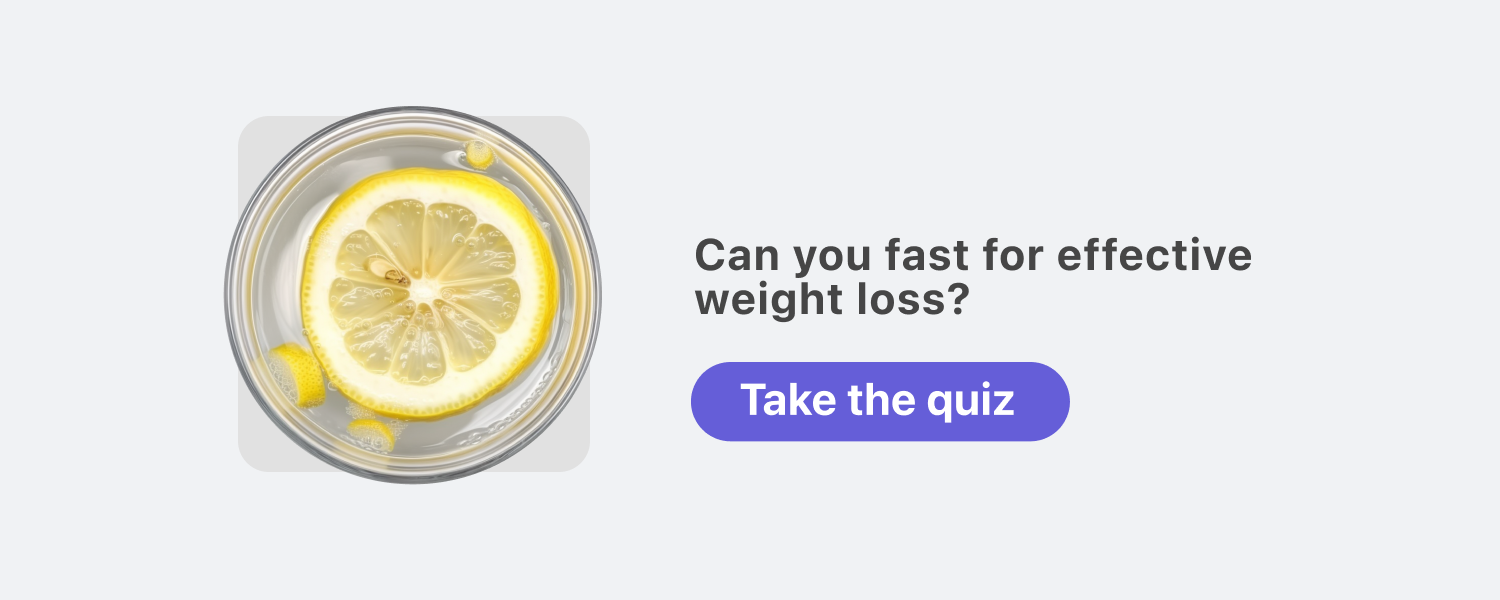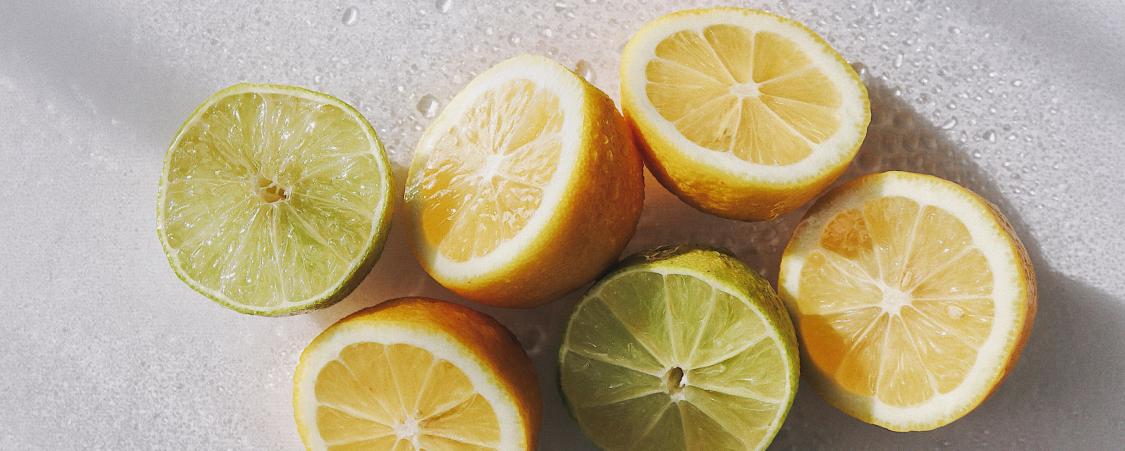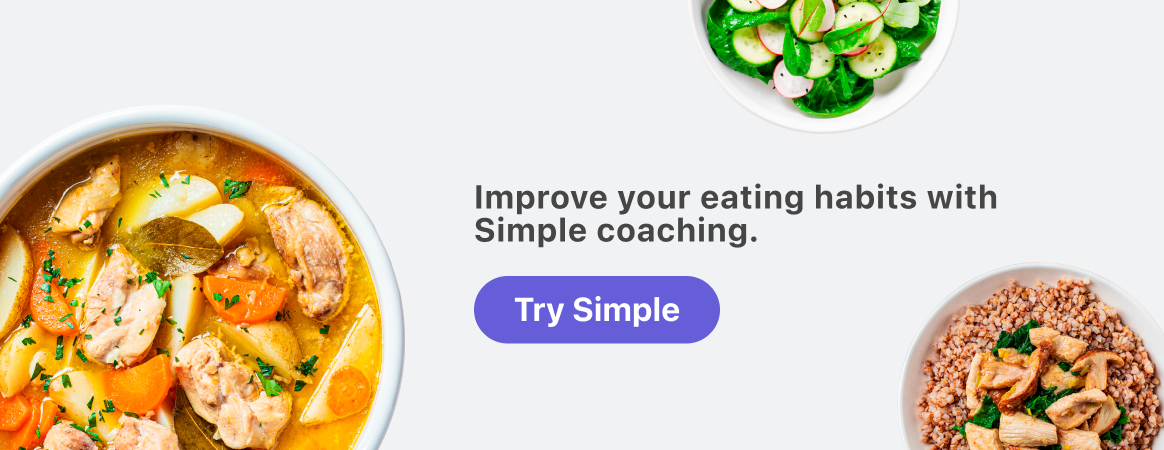Does lemon water break a fast? — explained by Simple

When you’re intermittent fasting, drinking plain old water can get pretty boring, pretty fast.
As a human with taste buds, you naturally want to bring a little flavor to your day. You spy a lemon on the kitchen counter. Could you add a few drops of that to your water, you wonder??

Or does drinking lemon water break a fast?
Let’s get some answers for you and see if we can add some zing to your fasting.

So, will lemon water break a fast?
When life gives you lemons, make lemon water. Even when you’re fasting!
What breaks a fast is any food or drink that contains calories. A whole lemon contains 12 calories and 3.2 g of carbohydrates. But when you make lemon water, you’re usually adding around 3 to 6 calories of lemon juice in total (about a quarter to half of the lemon).
So will lemon water break a fast? Nope!
However, calories can mount up. Be sure to not drink any more than 3 fl oz (roughly 90 ml) of lemon juice during your fast to be on the safe side.
Hold on, what is intermittent fasting?
Intermittent fasting is a style of eating where you rotate between periods of eating and not eating (i.e., fasting).
There are various schedules available that involve fasting either daily, on alternate days, or across the week. They all offer potential benefits around improving metabolic health, losing weight, and helping you change your eating habits. Check out our intermittent fasting guide for beginners for the lowdown on each intermittent fasting schedule we recommend.
The common theme that unites each intermittent fasting schedule is the fasting part, i.e., periodically taking a complete break from eating.
It’s this aspect that helps you enter ketosis, which is when your body uses stored fat — instead of the glucose provided by food — for energy. This, in turn, can lead to weight loss and improve your health.[1]
Unlike other diets which come with detailed lists of foods to eat and avoid, intermittent fasting puts the power back in your hands. First and foremost, it lets you choose when to eat. And then, what to eat. During intermittent fasting, you’re the boss.
If you’re curious about whether intermittent fasting would suit you, take our Simple quiz, and we’ll help you road test it!
Health benefits of drinking lemon water while intermittent fasting

Lemon water not only tastes great and helps you stay motivated while fasting, but it can also benefit your health in other ways.
Stronger immune system
Lemons are a rich source of vitamin C, an important nutrient that helps keep your immune system in fighting shape.[2]
So if you get sick, drinking lemon water could help you recover more quickly. Take that, germs!
Healthier skin
Lemon water could improve your skin. The antioxidants in lemons have been found to reduce damage caused by free radicals that can lead to wrinkles and other signs of aging.[3]
Increased hydration
While you’re intermittent fasting, it’s imperative that you stay hydrated.
It’s just that plain old H2O can get a little dull after a while. Adding lemon water to your fasting drinks roster can bring a little extra zest, variety, and enjoyment and help you hit hydration harder.[4]
To make sure you’re hitting your hydration goals, take our Simple quiz and get your hands on our hydration tracker (as well as a fasting buddy). We’ll send you reminders to drink, so the only thing you’ll have to worry about is whether you’re adding some lemon or mint to that next glass of water.
Reduced hunger
Water can also help regulate your appetite and curb hunger.[5]
This can be one of intermittent fasting’s most persistent side effects, so if adding lemon helps you get a little extra water in the tank, great!
Health risks of drinking lemon water while intermittent fasting
There are also some potential risks that come with regularly drinking lemon water.
Disrupted autophagy
Autophagy is a process where your body cleans up old or damaged cells during a fast.
Some science experts have suggested that the taste of lemon could stimulate digestive enzymes that would disrupt the autophagy process.
However, more research is needed before we can confidently draw a conclusion.
Tooth erosion
The acidity found in lemons has been associated with the erosion of tooth enamel.[6]
To avoid this, alternate lemon water with less-acidic drinks or drink it through a straw to minimize the risk of damage. You gotta look after those teeth!
Digestive issues
In some people, the citric acid found in lemons may result in some gastro-related symptoms, including heartburn, acid reflux, and other digestive issues.[7]
Lemon water alternatives
If you’re not a fan of lemon water, or you want to jazz things up even more — we’ve got you covered! There are plenty of alternatives that won’t break your fast.
Cucumber water
Made by simply adding a few slices of cucumber to your water, this drink is both refreshing and hydrating.
Ginger water
Grate some fresh ginger root and add to boiling water. Easy!
This drink not only spices things up but also has anti-inflammatory properties that have been shown to potentially soothe digestive issues.[8]
Mint water
If you prefer mint to ginger, try that instead for a similar anti-inflammatory effect.[9]
Fruit water
If you hanker after a different taste, try adding some fresh fruit to your water, like strawberries, limes, raspberries, or watermelon.
To really make this pop, throw in some herbs like basil or thyme. No need to worry about sugars, as only the essence gets released.
Herbal tea
On a cold day, you need a warm drink. Herbal tea is a great go-to here, so if you love to unwind with a cup of peppermint tea or are curious as to whether ginseng can boost your energy, try them during a fast!
What can you drink while intermittent fasting?

Given that hydration is so crucial when intermittent fasting — did we mention that already? [winks] — it’s important to know where you stand with all the drinks you might choose.
Let’s put some meat on the bones of that perennial intermittent fasting question, “What can you drink while fasting?”
Mineral water
Whether it’s plain or sparkling, mineral water is a top choice. It’s refreshing and hydrating, plus it contains minerals like magnesium, potassium, and calcium that keep your bones and blood pressure happy.
And nope, those minerals will not break your fast! Minerals are calorie-free.
Coffee
Coffee lovers, ascend!
Black, sugar-free coffee is good to go during your fasting window (remember to switch to decaf after lunch or if you’re sensitive to caffeine). Coffee could actually help suppress your appetite and increase your energy levels.[10]
If you can’t drink it black, no worries. There’s room for one cup of coffee with a couple tablespoons of milk during a fast. Just leave the sugar and cream until your fast is finished.
Tea
Like coffee, tea is fair game when fasting, and you’ll never be short on choice! The list of teas you could try is almost endless (we’ve suggested a few of the best here).
Green tea, in particular, could be valuable en route to your goals. It contains both caffeine and a polyphenol called EGCG, which have been linked to weight loss and weight maintenance. That said, these benefits were seen on high doses taken via supplementation, so you may need to drink several cups a day to see any benefits.[11]

What can’t you drink while fasting?
Up next, some drinks to avoid during your fast.
Fruit juice
Does lemon juice break a fast? No. But only because we add it to water and dilute the heck out of it. If it were possible to drink a glass of the stuff (please don’t try it!), it would break your fast.
So other juices — those you can drink neat — will break your fast due to their calorie content.
Soda and soft drinks
They’re full of sugar and full of calories. Fast-breakers, the lot of them. Unless they’re calorie-free, of course! A couple of diet sodas per fasting window is A-OK.
Milk
Keep it to 1 to 2 tablespoons per fast, and you’re golden. If you like to drink it by the glass, hold off till your eating window opens.
Alcohol
Vodka might be clear, but it’s still calorific. The same goes for gin, whiskey, rum, beer, and every other alcoholic drink you can think of.
Drinking alcohol can also dehydrate you, which is the exact opposite of what we want when fasting. If you’re out partying while fasting, stick a cocktail umbrella in a glass of sparkling water instead. (Especially if you’re planning to bust a move on the dance floor.)
Bone broth
Some say bone broth while fasting is OK. Others say to avoid it.
We’re on Team Avoid — bone broth while fasting gets the thumbs down from us. While it does contain some neat nutrients like protein and fat, those nutrients will break your fast.
Frequently asked questions about lemon water and intermittent fasting
A slice of lemon does not break a fast because it contains very few calories.
If you’re drinking pre-made lemon water, it may contain added sugars. If it does, that will break your fast. Always check the label of products or, better yet, make your own.
Lemon water does not spike insulin.
It doesn’t contain enough calories or carbs to do so.
Autophagy is a process where the body breaks down and recycles old or damaged cells. Some studies suggest certain nutrients like amino acids may affect autophagy.
However, there are not enough studies to know whether lemons impact autophagy. So, if that’s a specific goal of yours, stick to plain water.
You can’t drink honey lemon water during intermittent fasting. Not during your fasting window, anyway, because honey contains calories, which will break your fast.
Feel free to enjoy this during your eating window though! If you want to add some sweetness to your lemon water during your fast, consider using a natural calorie-free sweetener like stevia or monk fruit instead.[12]
According to research, intermittent fasting does not slow metabolism.
If you’re feeling confused as to why intermittent fasting is not working for you, it’s most likely not because your metabolism has slowed down. Check in with your nutrition choices, your sleep, activity levels, and stress and see what you can improve.

- Patikorn C, Roubal K, Veettil SK, Chandran V, Pham T, Lee YY, et al. Intermittent Fasting and Obesity-Related Health Outcomes: An Umbrella Review of Meta-analyses of Randomized Clinical Trials. JAMA Netw Open. 2021 Dec 1;4(12):e2139558.
- Carr AC, Maggini S. Vitamin C and Immune Function. Nutrients [Internet]. 2017 Nov 3;9(11).
- Telang PS. Vitamin C in dermatology. Indian Dermatol Online J. 2013 Apr;4(2):143–6.
- Dennis EA, Dengo AL, Comber DL, Flack KD, Savla J, Davy KP, et al. Water consumption increases weight loss during a hypocaloric diet intervention in middle-aged and older adults. Obesity . 2010 Feb;18(2):300–7.
- Parretti HM, Aveyard P, Blannin A, Clifford SJ, Coleman SJ, Roalfe A, et al. Efficacy of water preloading before main meals as a strategy for weight loss in primary care patients with obesity: RCT. Obesity . 2015 Sep;23(9):1785–91.
- Zimmer S, Kirchner G, Bizhang M, Benedix M. Influence of various acidic beverages on tooth erosion. Evaluation by a new method. PLoS One. 2015 Jun 2;10(6):e0129462.
- Your Digestive System & How it Works [Internet]. National Institute of Diabetes and Digestive and Kidney Diseases. NIDDK – National Institute of Diabetes and Digestive and Kidney Diseases; 2023
- Nikkhah Bodagh M, Maleki I, Hekmatdoost A. Ginger in gastrointestinal disorders: A systematic review of clinical trials. Food Sci Nutr. 2019 Jan;7(1):96–108.
- McKay DL, Blumberg JB. A review of the bioactivity and potential health benefits of peppermint tea (Mentha piperita L.). Phytother Res. 2006 Aug;20(8):619–33.
- Schubert MM, Irwin C, Seay RF, Clarke HE, Allegro D, Desbrow B. Caffeine, coffee, and appetite control: a review. Int J Food Sci Nutr. 2017 Dec;68(8):901–12.
- Hursel R, Viechtbauer W, Westerterp-Plantenga MS. The effects of green tea on weight loss and weight maintenance: a meta-analysis. Int J Obes . 2009 Sep;33(9):956–61.
- Zhou Y, Zheng Y, Ebersole J, Huang CF. Insulin secretion stimulating effects of mogroside V and fruit extract of luo han kuo (Siraitia grosvenori Swingle) fruit extract. Yao Xue Xue Bao. 2009 Nov;44(11):1252–7.
